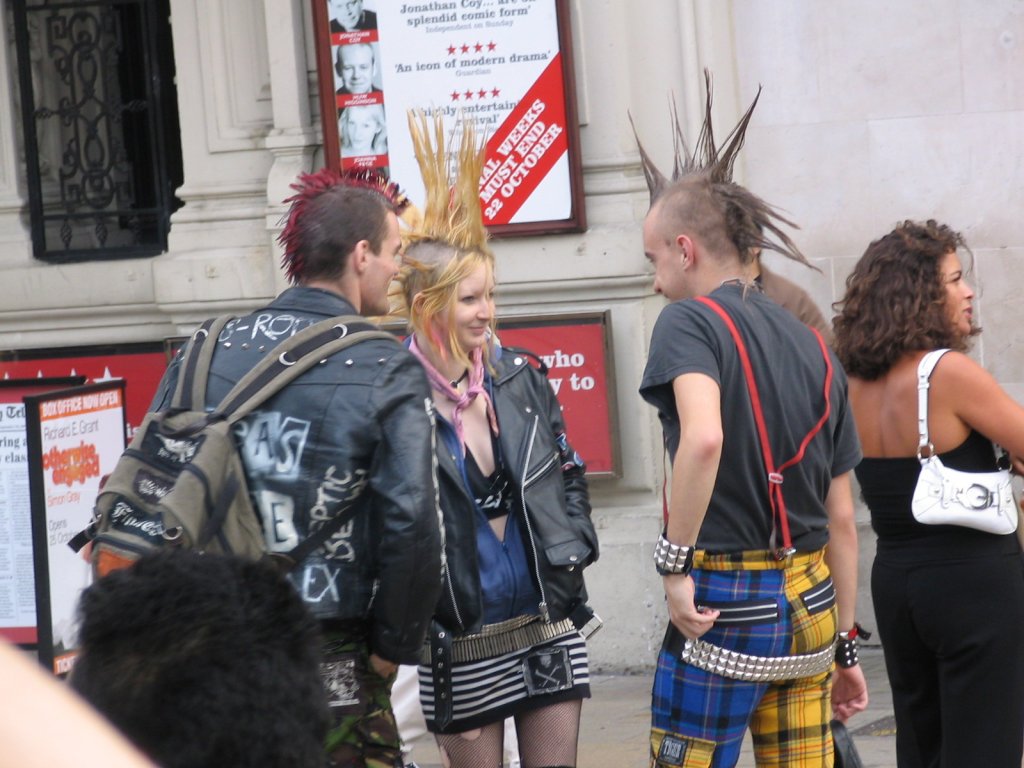Punk is only really punk because of women
Punk is hip again. Not surprising at a time when dissatisfaction with inequality is growing. Philosophy PhD researcher Georgina H. Mills wrote an essay on the role of women in the punk movement. She herself played in a punk band: ‘My favorite bands of the early years were led by women.’

In the last two years, Dutch punk bands like Hang Youth and Tramhaus experienced their breakthroughs. Rotterdam band Vulva caused Parliamentary questions and international acts such as The Chats, Viagra Boys, and Amyl and The Sniffers are booked at mainstream festivals and tour sold-out pop venues throughout Europe.
The origins of punk lie in the mid-1970s. Ever since its inception, this subculture has faced various prejudices. The question that always arises both inside and outside the punk movement is: what exactly is punk?
The answers to that question can be found in the book Punk Rock and Philosophy. A colorful collection of philosophical essays compiled by Joshua Heter and Richard Greene.
Georgina H. Mills, a philosophy PhD researcher at Tilburg University, has been interested in punk since she was a teenager. She herself played in the punk band Timewaster Anonymous, later abbreviated as TWAts. For the book Punk Rock and Philosophy, she wrote the essay ReMENbering the Punk Movement. In it, she writes about the influence of women on the early years of the British punk movement and how this influence is collectively forgotten.
You wrote an essay for the book Punk Rock and Philosophy. What do punk and philosophy have in common?
‘Every cultural aesthetic group and every youth movement carries philosophy implicitly and explicitly. With punk this is very explicit because it is a clear counter-movement.’
Punk is at the center of society. On the other hand, philosophers are often told that, from their ivory tower, they are too distant from society. How do you see this?
‘That criticism of philosophy is, I think, justified. I would like philosophy not to be in the ivory tower. The university is very traditional and can feel inaccessible to people outside academia. This shouldn’t be the case. Anyone can philosophize. Writers like James Baldwin and Audre Lorde have no philosophical background but are great philosophers.’
Your essay is about the influence of women on the early years of the punk movement in London. Why did you want to write about this topic?
‘My favorite bands of those early years were led by women. These women felt no barriers. That’s super interesting for a movement from the 1970s. This movement was explicitly a counterculture, explicitly rejected normal barriers, and offered structural access to music.

‘The punk movement said, ‘Music is for everyone.’ That’s a huge philosophical position. The point of view was: all you have to do to participate is participate. With just a few guitar chords, you could make your own punk song. No one had to ask permission from an authority. The punk movement is an aesthetic, democratic movement.’
‘Women were an important part of this counter-movement. Only that role is often forgotten in the history books. This corrupts the meaning of punk; I conclude in my essay. For when you forget the contribution of women, you not only undervalue the role of women but you also undervalue how inclusive the punk movement was. You take the punk out of the punk movement when you take the women out of it.’
Why is it that this inclusiveness seems to have been forgotten?
‘It just so happens that the most successful punk bands in history are male. The Clash is one of my favorite punk bands, but also one of the most successful ever. They were male, just like The Ramones.
‘I don’t think this is just a coincidence. No doubt there are reasons that male punk bands are more successful than female ones. Probably sexism plays a role in this. But the lack of memory of the role of women in punk, I think, is also because punk is associated with masculine behavior. Defiant, angry, and rebellious.
‘Anything that conveys the punk movement is not seen as feminine. And that’s a shame. Besides, we remember the most successful women of the punk movement mainly because of their activities after their punk careers. Vivienne Westwood’s collections only became popular in the 1980s when the punk craze had ended. Her work from the 1970s never comes to attention. Nevertheless, she is considered the grandmother of punk.
‘The same goes for the band Blondie. They were initially a punk band, but their success came later, during the new wave period. After they adapted their sound and slipped away from their punk background. There are also male bands for which this happened, but for female bands, this seems to be more of a pattern.’
How can we ensure that we collectively better remember women’s influence on the punk movement?
‘Listening to the music of women within punk is a good start. Think of bands like: X-Ray Spex, The Slits, but also contemporary bands like Big Joanie and Slagheap. Or bands that have been around for a long time and are still making music like Sleater-Keaney. Also, we need to change the stereotypes of what we think punk is. Too often that is still studs, spikes, Sid Vicious, and Johnny rotten.
‘Also, I would recommend Viv Albertine’s biography to anyone interested in punk. This is the best book I have read when it comes to punk. In this book, the former guitarist of The Slits talks about what it was like to be punk as a woman in the 1970s. For example, she tells how she and her female bandmates were thrown out of hotels because of their appearance. While the male band members of The Clash, with whom they were touring at the time, were welcome.’
Translated by Language Center, Riet Bettonviel






